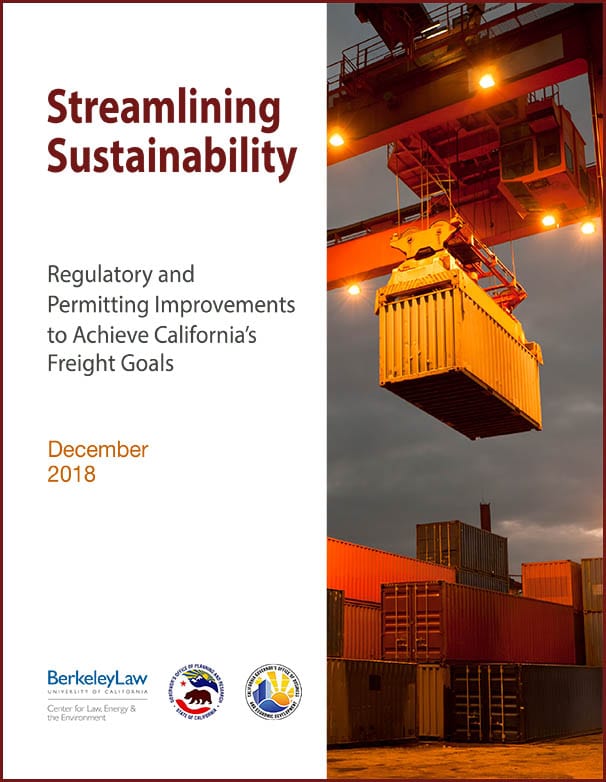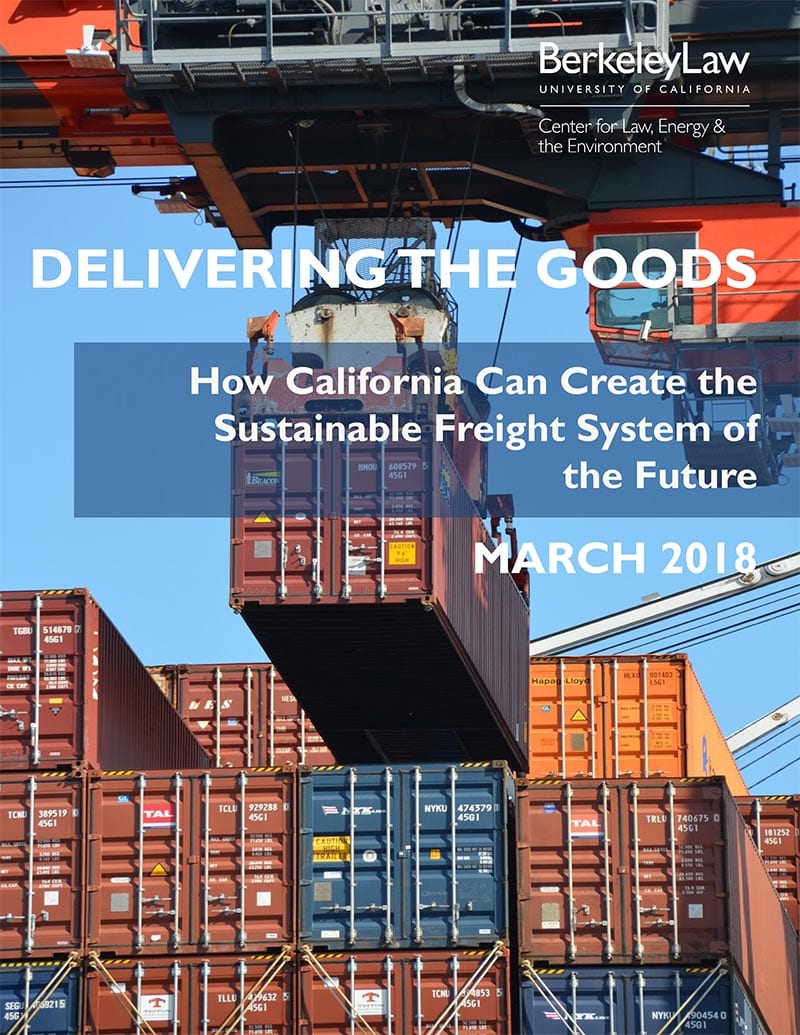 A new report released today from UC Berkeley School of Law, Streamlining Sustainability: Regulatory and Permitting Improvements to Achieve California’s Freight Goals, offers state and local policy reforms for California leaders to increase the sustainability and efficiency of the state’s freight system.
A new report released today from UC Berkeley School of Law, Streamlining Sustainability: Regulatory and Permitting Improvements to Achieve California’s Freight Goals, offers state and local policy reforms for California leaders to increase the sustainability and efficiency of the state’s freight system.
Freight is responsible for hundreds of thousands of jobs in California and feeds commerce and agriculture throughout the state and the entire nation. But the trains, trucks, aircraft, and ocean vessels that ship goods throughout California are responsible for a disproportionate amount of greenhouse gas emissions and harmful air pollutants (such as nitrogen oxides and sulfur dioxide), particularly in disadvantaged communities near railyards and ports. A range of strategies and technologies, from electrified heavy-duty trucks to increasing the use of rail at ports, can modernize the system and reduce emissions. But these projects can be challenging to implement in the current legal and policy ecosystem.
To reduce these impacts and maintain competitiveness, UC Berkeley Law’s Center for Law, Energy and the Environment (CLEE) partnered with the Governor’s Offices of Planning and Research (OPR) and Business and Economic Development (GO-BIZ) to offer recommendations to increase the rate that cleaner freight technologies are integrated into the system, while helping the state achieve the goals in 2016’s Sustainable Freight Action Plan.
Top recommendations include:
- Convening sustainable freight “red teams” to conduct holistic analysis and clear local and state-level permitting roadblocks for high-priority infrastructure projects;
- Facilitating “tiered” review under the California Environmental Quality Act to comprehensively assess impacts and benefits of related freight projects; and
- Increasing the use of community benefit agreements and project labor agreements to earn the support of local communities and labor groups most likely to be affected by new projects or technological developments.
The report is informed by a stakeholder convening held in the Governor’s Office, organized and moderated by UC Berkeley School of Law. It describes a range of other measures, from a messaging campaign to raise public awareness about the freight system to pilot programs that allow industry members to securely share key data, that could increase support for sustainable freight from the policy, industry, and community and environmental advocacy spheres.
The implications of a sustainable freight system are significant. Freight is directly involved in approximately one third of the California economy, including both exports and imports. For example, California is the largest supplier of food to the rest of the nation and the point of entry for the vast majority of goods imported from Asia. California’s freight system leaders will need to maximize its efficiency to retain this position of prominence while protecting California residents and workers. We hope these recommendations will help California achieve its ambitious emission reduction, public health, and economic competitiveness goals.
To download the new report, click here.
The Breakthrough Blog hosted an on-line Q&A with various experts on trends in freight in 2018. This issue is important because freight is a contributor to greenhouse gas emissions as well as harmful air pollution. In addition to me, respondents included:
- Doug Mueller: Breakthrough President and CEO
- Brooks Bentz: President, Breakthrough Supply Chain
- Jeremy Becker: Managing Director, Breakthrough Supply Chain
- Rep. Mike Gallagher (R-Wis.): Congressman for Wisconsin’s 8th District
- Matt Muenster: Senior Manager, Breakthrough Applied Knowledge
- Jenny Vander Zanden: Vice President, Breakthrough Fuel Recovery
 Doug Mueller kicked off the responses with some insight from industry, noting the high demand and lack of available labor supply:
Doug Mueller kicked off the responses with some insight from industry, noting the high demand and lack of available labor supply:
There has been strong economic growth in 2018, and that exacerbates some transportation challenges, such as high demand and tight supply in relation to trucking capacity, as well as rising energy prices.
The transportation energy landscape continues to evolve as new sources and types of energy gain market share. The most notable energy sources currently in use are diesel, natural gas, and some electrification. This evolution is supported and enabled by both technological advancements and regulation.
To accompany economic growth, demand is up, transportation energy inventories are down, and anything that represents a potential geopolitical situation brings a risk of price shock. So, there’s certainly been plenty of volatility in 2018.
Currently, clients are telling us there seems to be an imbalance in the relationship between shippers and carriers. Shippers bear the responsibility of getting their products to market through carriers. Because of high demand and lack of capacity, prices are rising, while quality of service declines, significantly for both in some cases.
You can read all the responses, including mine on sustainable freight, here. For more on sustainable freight policies, check out our recent Berkeley Law report and policy brief.
 California’s freight system contributes to one-third of the state’s economy. But it is also responsible for some of its most significant emissions challenges, including toxic air pollution and greenhouse gases. To discuss solutions, the Center for Law, Energy & the Environment (CLEE) at UC Berkeley Law is hosting a free webinar this Thursday at 10am on the future of sustainable freight in California, as part of the launch of a new report on the topic.
California’s freight system contributes to one-third of the state’s economy. But it is also responsible for some of its most significant emissions challenges, including toxic air pollution and greenhouse gases. To discuss solutions, the Center for Law, Energy & the Environment (CLEE) at UC Berkeley Law is hosting a free webinar this Thursday at 10am on the future of sustainable freight in California, as part of the launch of a new report on the topic.
CLEE’s forthcoming report includes a detailed set of recommendations covering near- and long-term policy and stakeholder actions to increase freight efficiency and sustainability, while facilitating economic growth. The report features policymaker, industry and nonprofit input from a recent Berkeley Law symposium on the steps needed to drive environmental and economic progress.
The webinar will discuss the report findings and other law and policy needs to achieve more sustainable freight. Speakers include:
- Elizabeth Fretheim, Walmart
- Adrian Martinez, Earthjustice
- Chris Schmidt, California Department of Transportation (Caltrans)
We will include time for audience Q&A.
For more information and to register, please visit this link. Hope you can join us!


